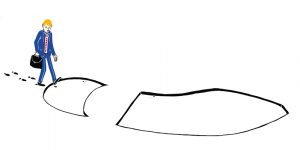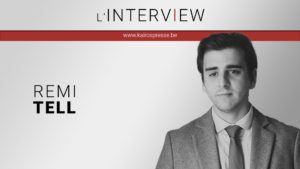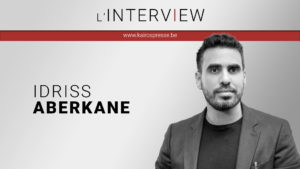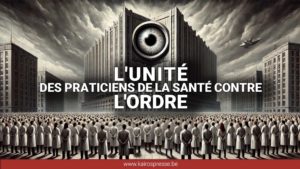« Custom requires that a sadist acknowledge the killing but not the pleasure. »
Karl Kraus
« Like the so-called Stalinist communism, the brown plague aims at the ever more ferocious overexploitation of wage labor. All ideological clothing ‑nation, race, homeland- only obscures this primary truth: more than ever, there is no war but rapine. »
Jean Malaquais
AS WE ARE (TREATED), WE JUDGE
In September of the year 2013, I was employed by the company Axe-Dro. It was a directory distribution operation. Pôle Emploi was at the origin of this hiring. The time needed for distribution in a given area was underestimated in such a way that I ended up working 17 hours without earning anything. What I was paid barely covered the cost of gasoline I had incurred. Fifty euros for 17 hours. Fifty euros at a loss. Mr. Koz was the head of the localAxe-Dro entity.
MERIT » ESTABLISHES A SUPERIORITY OF MAN OVER MAN
In the end, I had not intended to kill Koz and that was the most extraordinary thing. Basically, the masochistic logic that was imposed on me had been pushed so far that I lost both my reason, my will to live and the last illusions about this society. In the end, to have been stripped of the idea of killing a man who had caused me so much harm, to have been stripped of the idea of eliminating a soldier of capitalism who opposed you with unheard-of sarcasm and assurance, while he had precipitated you into a final and terrible humiliation, among so many others that had grown in recent years, that was the monstrosity of totalitarianism. Nothing reached Koz, he was impervious to any guilt. Yet these humiliations had reached a point of insanity, which was a blatant violation of all the fundamentals that I had been taught — I had been studying law for five years — that I was constantly being told about; it was obviously the most spectacular infringement of proclaimed rights and it was my life, from then on, from the possibility of being treated in this way, it was my life that was in danger.
There was nothing left to stop the rampage organized by capitalism, and at the same time there was this phenomenal force behind which every little bastard was hiding, with great confidence. This was the case for Koz. If to do good was to rally to the most powerful force and if it was necessary to do evil to do good, with a disconcerting ease, it was simply that he knew he was safe from any punishment because a force guaranteed him impunity. Another psychological spring was needed for this guarantee, and that was the feeling of superiority over the subjects thus cheated. Individualism could not justify everything. This cold egoism, which Marx calls « the icy waters of egoistic calculation », needs to be both relieved of guilt and assured of impunity. Anything that resembles the mechanical work of the Nazis, the « ever more ferocious exploitation of labor power » that underlies it and according to the definition given by the indomitable Jean Malaquais. In order to engage a soldier in Nazism and achieve the new planned conquests, it was necessary to convince him of his superiority and therefore to designate inferior beings.
The capitalist hierarchy is nothing more than the proclamation of an Aryanization based on « merit ». Merit is the ability to believe in it, to feel superior to subordinates. It is to be a little more « Aryan ». The difference between Nazi imperialism and today’s neo-liberal imperialism is that the latter is fundamentally not based on an idea of superiority of one race over another, but on a superiority of the value of the service it renders to capitalism. Koz was sure of himself, he was sure that to make people work Franco, it was his « merit » to provide an activity to dumb people. They were retarded compared to him and Axe-Dro is a company that displays a commiserating charter in its offices for the many disabled workers it employs. (Louis-Ferdinand Céline, the author of « Je me sens très ami d’Hitler », proposed that the employment of the sick should be the social watchword of tomorrow). In case he could have doubted the foundation of the ideology with which he was impregnated and the violent responses that could have been opposed to him, that would have torn him away from his certainties by a powerful « emotional shock », he benefited from impunity, that is to say from the financial, police, state and social power, in a word from totalitarianism, which guaranteed him that he would not be beaten up or assassinated at the threshold of his garage by one of these humiliated morons. Primo Levi recalled that the rare insurrections of Jews in the camps were the work of deportees who benefited from preferential regimes, from a better situation than the other prisoners. The « rags » did not revolt.
POLITICAL AND LEGAL LOCKOUT
This is how companies like AxeDro came into existence. For one thing, they enjoy impunity. No government has removed them from office despite their practices and their largely justified bad reputation. Better still, in my case, it was Pôle Emploi that organized a public meeting attended by about thirty unemployed people to whom Koz gave a speech that cleverly hid the heart of the trick. The bad reputation of this company is well known among lawyers. The management of Pôle Emploi could not ignore it. At the same time that I engaged with Axe-Dro, I set up, with Pôle Emploi, a file of help to repair my vehicle. In order to benefit from it, it was necessary to justify a work contract, an estimate and a closing of the file within two weeks. I have met all of these requirements. But I was refused help. The extravagant reason is that the administration put a date after the day I signed the file. Which institution objected to my request? Direccte Aquitaine. The Regional Direction of Companies, Competition, Consumption, Work and Employment… which includes the Labor Inspectorate… the Labor Inspectorate which has obviously not set up any large-scale operation, even if only to change the practices ofAxe-Dro. From then on I saw an institutional wall standing in front of me.
Secondly, companies such as Axe-Dro have set up a guarantee fund that finances the rare industrial tribunal cases that are brought against them. Thirdly, the « rags » do not revolt, they are dissuaded. The State simply maintains the illusion that the practices of such companies are contrary to the laws enacted by leaving a thin air duct that allows, sometimes, some employees to win at the Prud’hommes. But the State does not prohibit the practices of this company, and if it came to the idea of a refractory and cheated employee to incriminate at the same time Axe-Dro and Pôle Emploi (the State), which leads unemployed people into the clutches of the wild exploitation, the subject would be without resources A law firm made no secret of the fact that Pôle Emploi was one of their powerful clients and that they would therefore not defend me. A second lawyer finely discouraged me, for « so little ».
It was not the benefit I could have obtained from the repair that was important to me in this case. The damage was moral. It was that I get « justice ». It was that the civil society and the State recognize in this case that I had been treated, by this company, as the last of the slaves. I have to admit that the State granted me legal aid, but at the same time it deprived me of an aid that I had legally fulfilled and that it deprived me of it through an institution (Direccte) that included an administration (the Labor Inspectorate) that had not committed anything against the company that was precipitating me into a regime of advanced alienation.
For a mind trained at the university of the Republic, in social law, it was intellectual, moral, human foundations that were collapsing and that left the feeling of the savagery and barbarism of a locked system, in which the subject that I was was only a worm without rights, without recourse, without future, trampled on by an army of men and women who were performing marvelously the functions to which they were employed. Humanity was faltering and the feeling of belonging to it was also collapsing. How many men and women have I met who have taken part, each in their own role, in the margin of their attributions, but with full knowledge of the exploitation, the abandonment and the pathological wandering to which they gave me? Since then, every employee of Pôle Emploi, every employee of the Axe-Dro company (head of service, head of department, secretaries, logistics agents, etc.), the Direccte agent and his head of service, the law firms… there were too many.
As a last resort, I asked the intermediary of the general counsellor. The action of an elected official of the Republic, a man whose functions are the emanation of the will of the people, was powerless in front of the administrative machine. His intervention had no effect. This time, it was the democratic feeling that was affected in me. Faced with this political and legal lock, I saw a totalitarian machine. It is obvious that on the occasion of the last departmental elections, I saw no interest in voting because it is indeed the impotence of the will of the people in front of the totalitarian machine that dissuades 50% of the electorate.
IDEOLOGICAL AND CULTURAL LOCKING
In May 68, it was the students who initiated the revolt. Not « rags ». Basically, after Nazism, the poor in Europe no longer take the initiative for collective revolts. This is what makes us say that « Aryanization » has carried, that it has won through what is called today the « merit » society, with the fetishistic support for money that has progressively settled on the ashes of the class struggle. To justify both « merit » and the mad rush for money, there is nothing like « humanizing » the inhuman. There is nothing like awarding the France-Culture and Télérama prize to an author who is a company director and who, extraordinarily, makes entrepreneurship coincide with « humanism », notably through the myth of surpassing oneself. It is enough for this writer (Antoine Bello, Mateo) to portray an unlikely character who is both intellectually marvelous and an accomplished sportsman of the highest level. It’s as if Einstein had shone at Bayern Munich, Jonathan Swift at the Olympics and Mozart at the hammer throw. Or as if Zidane had written the Requiem and Michel Platini the theory of relativity. As if Laurence Parisot was the author of the Ten Commandments (among which « thou shalt exploit thy neighbor as thou shalt not exploit thyself »), as if Édouard Leclerc had spoken to the birds in the image of Saint-François and that he had ordered him to invest in the large-scale distribution. We reach the superman, Nietzsche hijacked by the Nazis, the myth of the most « deserving » man of all, the best Aryanized, the superior man in all fields. Imposture and contradiction: enterprise and humanism.
The poor do not have a voice in the scandal of poverty. It is at best a humanistic activity of the bourgeoisie. With sometimes a lot of success, with Jack London, Robert Tressel or George Orwell(Dans la dèche de Londres à Paris and Le Quai de Wigan). In a way, because most of the time now these writers evoke rather some other vicissitudes and some other benefits of the bourgeois and petty bourgeois life. Jean Malaquais is one of the few poor people who had access to publications and moreover, this man, quite apart from the rest, who never forgot his origins, nor the creek where he languished, nor the pincers of the argousins, nor the narrow-mindedness and the Franco-Vichy glory, nor the whores of literature, this man still proclaimed with rage: « God of literature, spare me from giving in to the putassery of the literati. They are not legion the writers, the filmmakers who were able to tear themselves away from poverty and make their voices heard. The 10 million French unemployed are not invited to speak. None of them is in all the singularity of the history and the personality that characterize it.
AT WORK WE DON’T HAVE FUN BUT THE POLITICAL AND SOCIAL ORGANIZATION OF WORK MAKES THE SUBJECT HAVE FUN
It is a truism to say that it was not a very enriching activity, very fulfilling to put directories in mailboxes, to be chased by dogs, to walk while dragging a cart full of « Yellow Pages », to solicit professionals who are most often disturbed and for whom the telephone directory is no longer a tool of first necessity, to run up against their reserved reception, to waste precious time looking for, from the file provided by the company, a file that is outdated, an address that no longer exists. What has been accomplished that is sacred? Creative? Of essential good to a properly constituted society? For what rewards? No thanks, few expressions of sympathy, and, in the end, on the contrary, by dint of tricks, 50 miserable euros that do not represent the amount of work done and do not cover the expenses incurred. We don’t have fun. We are bursting at the seams. It is the measure of a political and social organization which, from the Pôle emploi and a company of margoulins, administers overexploitation, and which, from the Labour Inspectorate to the lawyers, the courts and the elected representatives of the people, deprives you of any recourse. In the end, there is a subject broken up by a society, by its organization, by the fact that it is conceived for the purpose of subjecting to the most extreme condition of precariousness, man by man.
A lot of broken identities that have conveniently chosen to gather around a reason of exclusion of poorer than themselves, of more tried than themselves. But I did not choose the FN because my conviction has long been made: only the powerful can. All this is destructive for a democratic spirit, which does not resign itself to seek refuge in xenophobic, nationalistic gatherings and which has no intention of hating, which is within its reach, by means of a force, but which has found itself, quite simply, gradually, banally, to fear Men. To fear the Men of this society in all that constitutes them politically and socially. There are those who have not gathered around a cause of exclusion who end up in a lonely hole by shortening their life; there are those who contract diseases because the body fails. When an unemployed man immolated himself in Nantes recently, François Hollande considered it a personal drama. Perhaps a grain of sand could have made my case a personal tragedy. I want to say that in the political and social exclusion, in the paralysis of the democratic machinery, in their closure to the appeals, this grain of sand comes naturally to punctuate the course of the politically and socially rejected, of an exclusion of all the fields of the life, and it dooms him to a great loneliness and to the precipitation of his last social and affective relays in conflicts, accentuated by his exclusion, provoked by his exclusion, conflicts in which he is impotent par excellence because he is excluded from all parts, from all possibilities, from all moral and vital forces. Then he loses his life, his health, his head. « It is a personal drama » is a phrase that rings true for me, and that comes under the character carapace defined by Wilhelm Reich. It is an armature of notorious insensitivity and denial that can only have dire consequences. Words are powerless to restore pain and there is at the bottom all that legitimate rage that is forced to choke and which we know that once asphyxiated, by the repressive apparatus and censorship of totalitarianism, it irremediably contaminates the body and the mind. « Faced with a government that today obliterates singular lives in the abstraction of the objective of the figure, and then obscures this very abstraction in a rhetoric of exemplary narrative, there is no other way out than to tell several stories, and to tell several lives » (Collectif Maurice-Florence, « Archives of Infamy »).
Even if it is little consulted, if it is not understood, I have been very reluctant to submit this text. My first hesitation is the fear of suffering, in one way or another, the consequences. Hannah Arendt said that when you attack a bureaucracy, you can expect it to fight back. In these lines, I do not attack, I defend myself. My second hesitation is to shake up potential readers with some radical language. That’s why I thought it was better to have this text in a magazine or newspaper because then it is subject to the readers’ choice to get them. He can meet affinities, readers already partially convinced of what is exposed. There is strictly no chance of convincing others who have no disposition to understand it and who have been relatively preserved or who have taken an active part in the social organization that breaks down the precarious subject. The web has some advantages but also some disadvantages, which have become, it seems to me, in recent years more decisively cumbersome.
It is finally the feeling of « lost for lost » that decides me to this publication.
Régis Duffour







